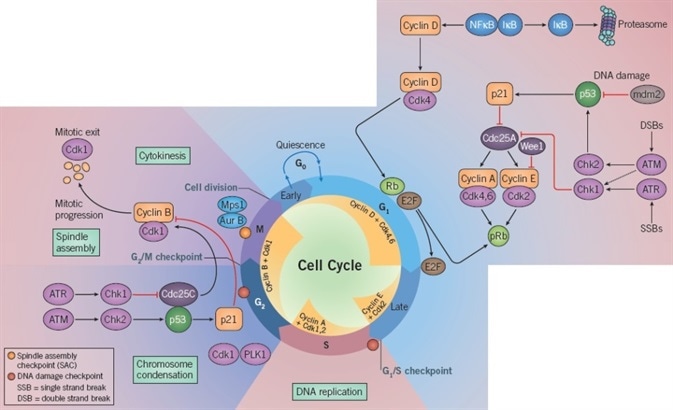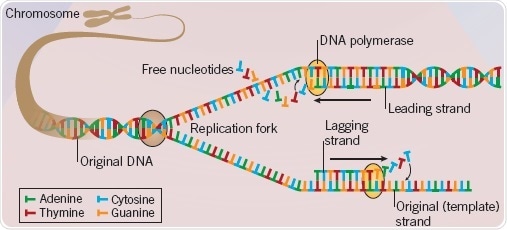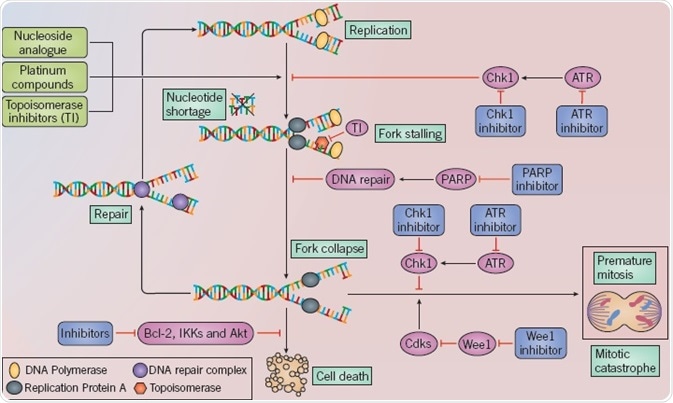All stages of the cell cycle in normal cells are tightly controlled. In cancer cells, several proteins and genes that impact the progression of the cell cycle are overexpressed or mutated and turn into oncogenes. The proteins involved in cell cycle regulation, specifically DNA damage and DNA replication, are significant cancer therapeutic targets.
Cell Cycle Progression and DNA Repair
G1/S, intra-S phase, and G2/M phase are three important regulatory cell cycle checkpoints. A cell can pass through these checkpoints only in the presence of stimulatory signals and in the absence of DNA damage. The cyclin-dependent kinases (cdks) family and tumor suppressor proteins control these cell cycle checkpoints. Cdks function in tandem with their regulatory subunits, cyclins, in controlling cell cycle progression. Cdks are constitutively expressed and controlled by different phosphatases and kinases, including Cdc25 phosphatase and Wee1 kinase.
DNA damage is detected and repaired at particular points in the cell cycle. This process is triggered by ATM kinase and ATR kinase, and DNA damage sensors. Signaling cascades are initiated by the checkpoint kinases Chk1 and Chk2, in turn activating DNA damage checkpoints in G1 and G2. The spindle assembly checkpoint (SAC) prevents the anaphase of mitosis until the correct arrangement of all chromosomes on the spindle occurs, thus preventing aneuploidy. Kinases including polo-like kinase (PLK1), aurora kinase B (Aur B), and Mps1 are involved at different control points in the cell cycle.

Fig 1. A diagram showing cell cycle progression and DNA repair. Image credit: Tocris Bioscience
DNA Replication
During S-phase, DNA replication takes place in five stages. They are: initiation, unwinding, primer synthesis, elongation, and termination. Helicase enzymes “unwind” the DNA double helix, and telomerases decrease the ensuing torsional strain, making the single strands exposed and initiating the replication fork. The lagging strand of DNA is produced by Pol δ and the leading strand of DNA is produced by Pol ε. For both DNA polymerase ε and δ, PCNA is a cofactor and acts as a DNA clamp, which is significant in DNA synthesis as well as DNA repair. At the end of the termination phase, a phosphodiester bond is formed by DNA ligases, connecting the DNA strands together and forming new double-stranded DNA.

Fig 2. A diagram demonstrating DNA Replication. Image credit: Tocris Bioscience
Targeting Cancer Cells
Replicative stress can be enhanced by targeting critical DNA replication checkpoints and replication machinery, as well as by depleting nucleotides, thereby promoting fork collapse and fork stalling, which causes mitotic catastrophe and death in cancer cells.

Fig 3. A diagram showing the targeting of cancer cells. Image credit: Tocris Bioscience
References
- Annunziata and O’Shaughnessy (2010) Clin. Cancer Res. 16 4517.
- Barr et al (2004) Nat. Rev. Mol. Cell Biol. 5 429.
- Dobbelstein and Sorensen (2015) Nat. Rev. Drug Discov. 14 405.
- Fu et al (2012) Nat. Rev. Cancer 12 104.
- Hochegger et al (2008) Nat. Rev. Mol. Cell Biol. 9 910.
- Lapenna and Giordano (2009) Nat. Rev. Drug Discov. 8 547.
- Lord and Ashworth (2012) Nature 481 287.
- Malumbres and Barbacid (2009) Nat. Rev. Cancer. 9 153.
- Rastogi and Mishra (2012) Cell Div. 7 26.
- Williams and Stoeber (2012) Pathol. 226 352.
About Tocris Bioscience
Tocris Bioscience is your trusted supplier of high-performance life science reagents, including receptor agonists & antagonists, enzyme inhibitors, ion channel modulators, fluorescent probes & dyes, and compound libraries. Our catalog consists of over 4,500 research tools, covering over 400 protein targets enabling you to investigate and modulate the activity of numerous signaling pathways and physiological processes.
We have been working with scientists for over 30 years to provide the life science community with research standards, as well as novel and innovative research tools. We understand the need for researchers to trust their research reagents, which is why we are committed to supplying our customers with the highest quality products available, so you can publish with confidence.
Tocris is part of the protein sciences division of Bio-Techne, which also includes the best in class brands R&D Systems, Novus Biologicals, ProteinSimple, and Advanced Cell Diagnostics. Bio-Techne has united these brands to provide researchers with a full portfolio of research reagents, assays, and protein platforms. For more information on Bio-Techne and its brands, please visit bio-techne.com.
Sponsored Content Policy: News-Medical.net publishes articles and related content that may be derived from sources where we have existing commercial relationships, provided such content adds value to the core editorial ethos of News-Medical.Net which is to educate and inform site visitors interested in medical research, science, medical devices, and treatments.